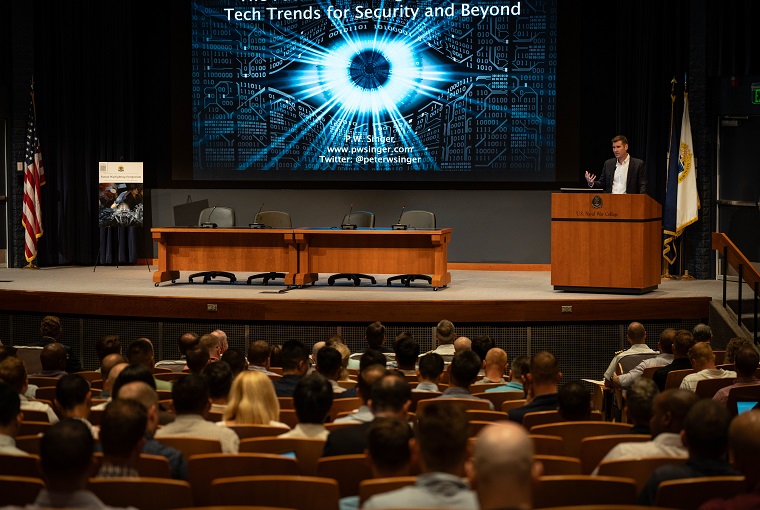U.S. Naval War College Begins New Academic Year With Focus on the Future

Newport, R.I. - The U.S. Naval War College (NWC) began its 2023-2024 academic year by holding a convocation ceremony and its seventh Future Warfighting Symposium (FWS), onboard Naval Station Newport, Aug. 8-10.
Convocation led the introduction of the academic year, welcoming more than 500 students from all six branches of the U.S. armed services, civilian employees of the U.S. federal government, and international military officers from 44 different nations.
The FWS followed with a theme of “Innovation and the Future of Joint Warfare,” featuring guest speakers and panels discussing emerging and disruptive technologies, cyber warfare, and space operations that are changing the character of war.
During the FWS, Rear Adm. Pete Garvin, president of NWC, stated that facing challenges posed by the changing landscape of war demands adaptation, ingenuity and integration.
“Today’s symposium responds directly to these challenges,” Garvin commented, adding that learning from the past and applying those lessons to emerging technologies and shifts in geopolitics is crucial.
A special emphasis was placed throughout the symposium on discussion of the future of warfare from the perspective of the Chairman of the Joint Chiefs of Staff’s special areas of emphasis, including joint professional military education, supporting the Secretary's Tri-Service Maritime Strategy, and aligning with the National Defense Strategy.
Students listened to and participated in five panel discussions, supported by more than 20 speakers covering topics such as conflict and competition in cyberspace, deterrence in the 21st century, artificial intelligence and data analytics, space domain, and engendering great power competition.
Panel segments enabled a comprehensive understanding of these issues and challenged students to critically reflect on their changing characteristics to determine best leadership strategies for addressing them upon returning to the force.
The symposium also featured remarks by Peter Singer, Ph.D., a strategist, professor, and author, best known for his writings and expertise on privatized military services, robotics, cybersecurity, cyberwar, and the influence of social media on war.
Speaking about the impacts and imminent importance of artificial intelligence, Singer stated, “It is important to understand that we are only at the start of this. There is no other technology area that is seeing as much activity by as diverse an array of actors as this space.”
“Technology doesn’t stop,” Singer added. “I would argue that what’s playing out is a revolution, but it’s not the robot revolution, its actually more like an industrial revolution.”
Eric Schmidt, Ph.D., former CEO of Google and chair of the DoD Defense Innovation Board, also addressed students, explaining that “innovation power” is needed in addition to traditional models of hard and soft power in order to compete on a global scale.
“I define innovation power as the ability to invent, adopt and integrate new technologies,” said Schmidt. “I argue that it’s fundamental to our military hard power, as developing and fielding advanced weapon systems will strengthen deterrence and, if necessary, war winning capabilities.”
By focusing on cutting-edge technologies to prepare students for successful leadership in complex operations, and challenging them to think innovatively about capabilities and threats across multiple fluid and unpredictable domains, NWC’s FWS also supports the Chief of Naval Operations’ (CNO) Design for Maintaining Maritime Superiority strategy.
Established in 2017, the FWS provides U.S. and international students the opportunity to engage with subject matter experts from the U.S. Department of Defense (DoD), U.S. government and private industry to further their training and education on new, impending forms of war. The event marks the beginning of the NWC curriculum, delivered to the college’s in-residence student body, comprised of mid-grade and senior officers from uniformed services, government agencies and partner and allied militaries. Students earn a Master of Strategic Studies degree as well as joint professional military education credits applicable toward future career opportunities.
NWC delivers excellence in education, research, and outreach, informing today’s decision-makers and educating tomorrow’s leaders. The college provides educational experiences and learning opportunities that develop students’ ability to anticipate and prepare strategically for the future, strengthen the foundations of peace, and create a decisive warfighting advantage.
